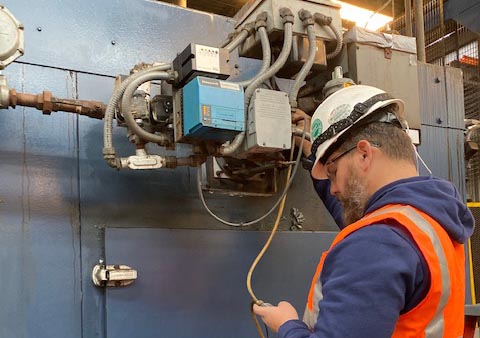For many businesses, staying on top of NFPA Article 86 guidelines is of paramount importance. Keeping things running smoothly, keeping employees and expensive equipment safe, and meeting the requirements necessary to stay in business takes a lot of effort. The NFPA requires annual testing, burner adjustments, and a detailed report of findings; and, Metro Services Inc. provides real solutions to help businesses all over the world meet and exceed these critical requirements.
MSI has developed a safety survey that exceeds all requirements outlined by the NFPA, and also has the ability to tailor that survey to meet other requirements like UL, CSA, and other entities whenever necessary. What’s more is that Metro Services has also established a web portal for clients that houses all information about their accounts including reports, settings, recommendations, serial numbers, model numbers, photos, and more– all easily accessible with just the click of a mouse. Your company’s data will be available to you anytime you need it, and our expert staff will be available to you as well.
Safety is king for us at MSI, and we believe safety is achieved through intentional planning, complete understanding, and preventative maintenance of your facility including all the working parts therein. We understand all the steps necessary for ensuring safety in your facility can be an undertaking, and MSI is here to help. From efficiency to safety and maintenance, we can be your go-to for keeping it all running smoothly. View a sample of our safety survey report here.
FAQs about Combustion and Burner Safety:
Q: How often do you have to have an inspection?
A: Yearly! Annual inspections and reports are required by the NFPA to ensure safety standards are being met.
Q: What codes and standards are applicable to my equipment?
A: Generally speaking, when it comes to boilers and combustion equipment (NFPA) codes 54, 85, and 86 here in the States and EN 746-2 and EN 676 throughout most of Europe and Israel.
Q: What will you find during inspections?
A: During a thorough inspection of your facility we may find issues ranging in severity, from things to be aware of to extremely critical issues that must be addressed immediately.
Q: What happens after an inspection?
A: Our team can help with general upkeep of your facility and equipment in areas such as burner tuning, and addressing any safety hazards that arise. You will have a report in hand listing all deficiencies as well as how to correct them.
Q: What factors play into industrial oven safety?
A: Airflow, dirt, operator knowledge, proper training, schematics, tuning, and even the ever present production vs maintenance issues that seem to exist at so many facilities.
Q: What is the difference between Class A and Class B ovens?
A: There are different classes of ovens, each serving different purposes and each requiring different upkeep and safety measures. Class B ovens are for clean processes that require no flammable or combustible materials be heated, whereas class A ovens are units that can be utilized in processes that do make use of combustible components. We think of it as B is BASIC while A means something flammable could be present in the AIR.
Q: What is the benefit of preventative maintenance?
A: Well-planned maintenance of your equipment can majorly maximize uptime and efficiency, while also staying ahead of potential problems that can be costly and lead to unexpected downtime. It, when paired with burner tuning, is the single most effective way to ensure your burners are running efficiently.
With questions, or to schedule a safety inspection or maintenance, reach out to MSI today! We’d love to assist you while ushering your facility toward greater productivity and safety.

